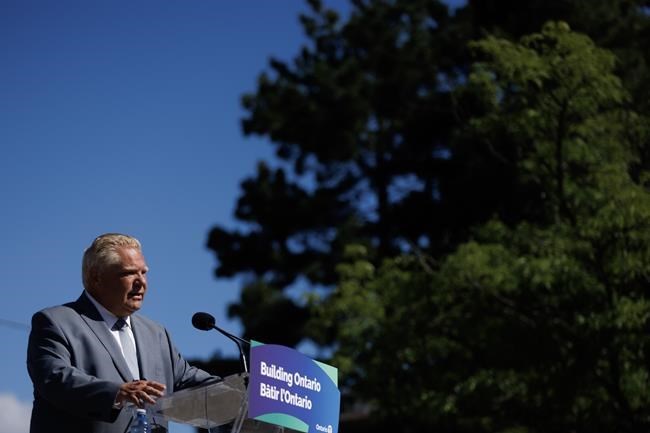TORONTO — The province says it is creating a working group to implement recommendations made in a damning auditor general's report on the government's decision to remove land from the protected Greenbelt.
A memo from Premier Doug Ford's chief of staff and the secretary of the cabinet to ministers' chiefs of staff and deputy ministers says all cabinet submissions to address the recommendations must be complete and include options and risks during the approval process.
The memo comes as the province works to implement 14 of 15 recommendations from Auditor General Bonnie Lysyk, although Ford has said the government will not review its decision to open up part of the Greenbelt to housing development.
Lysyk found that developers who had access to Housing Minister Steve Clark's chief of staff, Ryan Amato, at a housing conference dinner last September wound up with 92 per cent of the land that was removed from the Greenbelt.
The integrity commissioner is reviewing Ford's request to investigate Amato.
Lysyk found that the process of opening up the Greenbelt was biased toward certain prominent developers that also disregarded or ignored possible environmental, agricultural and financial risks and impacts.
Last year, the province took 7,400 acres of land out of the Greenbelt and replaced it with about 9,400 acres elsewhere.
Lysyk found that when specific properties tied to prominent developers did not meet the environmental criteria to build on those lands, the criteria was dropped, rather than look for other parcels of land.
"A comprehensive response to the report is a top priority and a working group is being established to support implementation," the memo said.
Until the working group is operational, chiefs of staff and deputy ministers must provide appropriate consultation, including with Indigenous leaders. The memo also said submission timelines for cabinet and cabinet committees allow enough time for due diligence by officials and consideration by committee members.
Lysyk found the Greenbelt removal was done far too quickly over a three-week period and the entire process was largely controlled by Amato.
Both Ford and Clark have denied they tipped off developers before they removed land from the Greenbelt and said they have not received any benefit from that decision.
Both said they had little knowledge of the details of the land swap before it went to cabinet last year.
Ford admitted the Greenbelt land selection process was flawed and pledged to do better going forward
The leaders of opposition parties, along with experts, questioned whether a chief of staff could make a decision on an important government file without the housing minister's knowledge.Â
Amato was assigned to his role as Clark's chief of staff by the premier's office.
Among Lysyk's other recommendations was a call for "records retention," as some emails were missing when she looked for them. Personal emails were also used during the process, she found.
Lysyk also admonished the government for its use of confidentiality agreements, which non-political members of the public service had to sign as it worked on which lands to remove from the Greenbelt.
That's another area the province said it is addressing.
"We also ask that during this period, all instances where confidentiality agreements are proposed be flagged for cabinet office and/or Treasury Board Secretariat, who will bring these matters to our attention," the memo said.
"Please ensure adherence to records retention requirements, including the documentation of materials received by third parties and only use government emails for work related matters."
This report by The Canadian Press was first published Aug. 14, 2023.
Liam Casey, The Canadian Press




